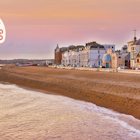
How to get around Manchester: from free buses to a swaggering stroll, some might say it's got it all

Apr 23, 2022 • 7 min read

Manchester’s electric tram system is extensive, covering almost 100 different stops across the city © Alberto Manuel Urosa Toledano / Getty Images
As the birthplace of the UK’s first bus service and the world’s inaugural passenger railway, you can expect Manchester to be fairly easy to get around.
While driving is generally a big no-no thanks to the city center’s busy or totally pedestrianized streets, walking is always a good option – if the weather stays fair, that is. And if the heavens do open or you want to venture further afield? Manchester has good public transport to get you from A to B.
Walking around Manchester City Center
One of the best ways to explore Manchester City Center is on foot. Most of the major attractions – from the National Football Museum to the John Rylands Library – are situated here, and the area is actually quite compact. You can easily walk from one end to the other within 30 minutes.
On sunnier days, consider strolling down Oxford Road to attractions like the Whitworth Art Gallery, Elizabeth Gaskell’s House and Victoria Baths. Some of the top Manchester neighborhoods like Ancoats and the Northern Quarter can also be explored without public transport.
To save money and see the sites, take the bus
There are various types of public transport available in Manchester, most of which fall under the Transport for Greater Manchester umbrella. Buses are probably the cheapest option – and in some cases, they're even free. You’ll find services leading to every nook and cranny of the city and its surrounding suburbs.
Nearly 20 different bus companies operate across the city, which can make buying tickets a little confusing (and not to mention expensive) if you’re using multiple different routes. Plans are in place to bring the bus system back under public control and make it more like London’s, but not until 2023.
Contactless payments keep things simple: just tap the machine with your bank card or smartphone as you board. There’s also the option of buying a System One travelcard. These can be used for unlimited bus travel on any service, starting at £6.40 (US$8.35) for one day or you can extend them to include tram and train travel for £10.40 ($13.60) a day.
Top tip: Got tickets to a gig that finishes late? Take advantage of the Manchester night buses. These are run by Stagecoach and operate until the early hours, with services journeying as far as Sale, Stockport and Manchester Airport.

Take advantage of the free bus
Despite its unimaginative name, the free bus (formerly known as the Metroshuttle) is a lifesaver for those wanting to get around Manchester without spending heaps on public transport.
The hop-on, hop-off service has three different routes around the city center, each one beginning and ending at Manchester Piccadilly station. Two of them run during the day (usually starting at around 7am), while route three is an evening service operating between 7pm and 11:30pm.
Hours are slightly different on weekends, so always double-check the free bus website for up-to-date information.

To reach all corners of the city, take the tram
Manchester’s electric tram system is extensive, covering almost 100 different stops across the city. It’s run by Metrolink and split into four zones. You’ll likely spend most of your time in zone 1, the city center. Nevertheless, it’s possible you’ll want to head south to Didsbury, west to Salford Quays or north to Heaton Park, all of which sit in zones 2 to 4.
Note that the trams aren’t free in Manchester, nor can you use an Oyster card for them like on the London underground. However, Metrolink has a similar travelcard option that’s great if you’re planning on multiple journeys in a short span of time.
Trams across all seven lines leave very regularly, meaning you don't really need to plan ahead. Just turn up at the station, purchase your ticket or tap in with your travelcard using the machines on the platform.
Top tip: If you’re going to use the tram more than once a day, opt for a travel card, starting at £1.90 ($2.50) for an off-peak zone 1 day pass. You can also get an all-zones seven-day travelcard for £31 ($40).

Catch the train to the suburbs
Several rail companies operate in and around the city. This makes catching the train a viable – and often cheap – way to get around Manchester or reach other nearby cities. There are three major stations in the city center: Victoria, Piccadilly and Oxford Road.
Catching the train is one of the fastest ways to access suburbs like Altrincham and East Didsbury. Additionally, you can get to some of Manchester’s best day trip destinations – from Edale in the Peak District to the Viking city of York – by rail.
Top tip: Some train companies offer advance tickets. This includes TransPennine Express, which operates intercity trains between Manchester, Leeds and York, and Avanti West Coast, whose services run to London, the Lake District and Scotland. Buy tickets up to six weeks in advance for cheaper deals, and consider getting a railcard.
Cycling can be a safe way to get around
Manchester is very flat and has numerous dedicated cycle paths. It’s typically safe to cycle in Manchester City Center, although you’ll need to be wary of traffic during peak commuting times (typically early morning and late afternoon) and take note of any bus lanes.
A brand new cycle hire scheme run by Transport For Greater Manchester launched at the start of 2022, although the number of bikes available is currently fairly limited. You will find a few independent bike-hire companies such as Manchester Bikes or Brompton Bike Hire.
Having a car isn't really worth the hassle
If you’re wondering what the traffic is like in Manchester, the answer is chaotic. The city center is crisscrossed by narrow one-way streets and busy roads with multiple traffic lights that always seem to turn red as soon as you reach them.
It’s really only worth hiring a car if you’re planning on spending lots of time in the suburbs or other cities and towns. Your accommodation might also sway you, as most hotels in the center won’t offer free parking. Pay and display street parking is limited, while big multi-story car parks are expensive and not always the safest place to leave a car overnight.
Getting to and from Manchester Airport
With international and domestic flights arriving at all hours of the day, flying to Manchester is a popular option. Manchester Airport sits just 14.5km (9 miles) south of the city center, and there are multiple ways to reach it.
Train services leave Manchester Airport station every 10 minutes or so and can get you to Manchester Piccadilly within 20 minutes. Metrolink trams also run to and from the airport – a good option if you’re staying further out in places like Altrincham or MediaCityUK.
Then there are taxis and private-hire vehicles, such as Uber or StreetCars. They can usually get you anywhere in the city center for under £20 ($26). For late-night arrivals and departures, Manchester’s night buses are a budget-friendly option. Just don’t be surprised if you’re sitting next to a bunch of rowdy students making their way home after a night out…
Accessible transportation in Manchester
Almost all of Manchester’s public transport is accessible for those with disabilities. The city’s buses, trams and trains can accommodate wheelchair users, thanks to ramps and low floors, plus there are audible announcements and visual videos to alert passengers of upcoming stations and stops.
Extra assistance is available from some companies too. For example, Arriva bus users can apply for a Journey Assistance Card, which lets you subtly inform bus drivers that you have a hidden disability and may need help. Manchester residents with accessibility issues can also get TFGM passes for cheap or free travel.
When it comes to taxi services, most black cabs take wheelchair users. You can also use TFGM’s Ring and Ride service to book affordable and accessible mini-buses for journeys within the city.

Why I love walking around Manchester
Walking is always my prepared mode of transport, particularly in a city as small as Manchester. It’s no more than 7 sq km (4.5 sq miles), and it’s brimming with beautiful unassuming buildings you might miss entirely if you travel by tram or bus.
Manchester is mostly set out in a grid system, making it tricky to get lost. Don’t be afraid to veer off the major thoroughfares like Deansgate or Portland Street. There are usually plenty of alternative routes, some of which take you through pretty squares like St Anns, or past cool local landmarks, like the Arch of Chinatown on Faulkner Street.
And if it starts to rain, as it so often does in Manchester, simply hop on the free bus or take shelter in a coffee shop. You could also use the weather as an excuse to duck into one of the city’s lovely libraries such as the Central Library or Cheetham’s Library.
You might also like:
The best time to visit Manchester for food, festivals and football
What are the best free things to do in Manchester?
Manchester’s new art trail turns the city into an open air gallery
Explore related stories

Destination Practicalities
Ferry across the Mersey – and the other best ways to get around LiverpoolAug 23, 2022 • 7 min read






 Public Transport7 of the best day trips from Manchester: cities, peaks, and seaside are all within reach
Public Transport7 of the best day trips from Manchester: cities, peaks, and seaside are all within reachApr 4, 2022 • 7 min read
 Public Transport6 easy day trips from York to see moorlands, markets and coastal castles
Public Transport6 easy day trips from York to see moorlands, markets and coastal castlesJan 15, 2022 • 7 min read
 Sustainable TravelThe best short breaks from London are just two hours by train
Sustainable TravelThe best short breaks from London are just two hours by trainSep 15, 2021 • 8 min read
